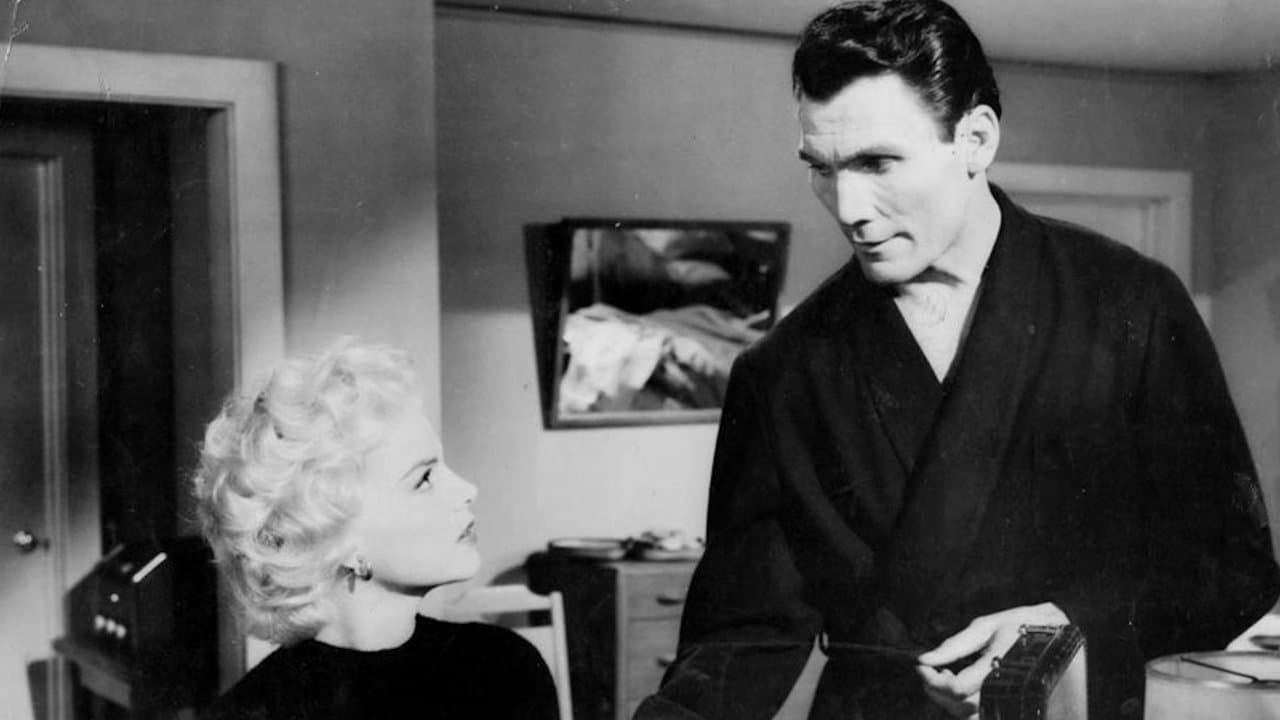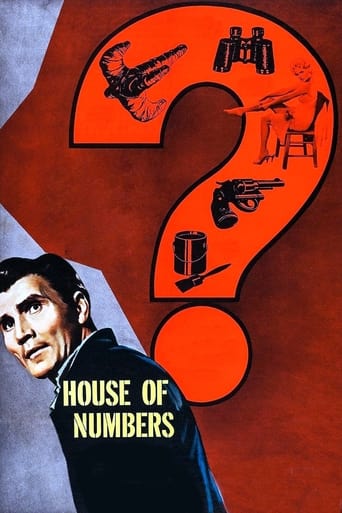SpuffyWeb
Sadly Over-hyped
Afouotos
Although it has its amusing moments, in eneral the plot does not convince.
Bob
This is one of the best movies I’ve seen in a very long time. You have to go and see this on the big screen.
TheLittleSongbird
The main point of interest, personally, of 'House of Numbers' was Jack Palance, an always watchable actor, despite his resume being a very mixed bag, who specialised in playing villains and intense characters.Palance, in a dual role as two brothers, is also by far the best thing about 'House of Numbers'. He does fare better as Arnie, the role is meatier and plays to his strengths far more, allowing him to show some menace and intensity without ever going overboard. He does however do a good job too as Bill, the more sympathetic role which sees Palance more appreciatively understated than usual but in comparison Bill is a little underwritten though still easy to identify with. Overall though, he is incredibly effective at differentiating between the two brothers, a demanding task and he does excellently.It's not just Palance that makes 'House of Numbers' worth seeing though. The rest of the performances are also very good, with Barbara Lang beautiful and poignantly subdued and Harold J. Stone effectively cunning. You would be hard pressed to find a nicer prison warden than the one played by Edward Platt here, and Timothy Carey is very memorable and quite a breath of fresh air. 'House of Numbers' is very nicely made, with beautiful moody photography that never looks jagged or blurry and the prison is an imposing character on its own. André Previn's music score is ominous but also subtle and composed and placed cleverly.While the story is less than perfect, there are some twists that keep it from being a standard thriller and there is some low-key suspense. The prison escape scheme is at times pretty ingenious. The characters maintain interest and the chemistry between the actors is continually good. 'House of Numbers' also could have been much more. It did need more pace and excitement than what Russell Rouse managed to provide, especially the ending which was rather too sedate for my tastes. The script is underdeveloped and confused, and while it is not dull by all means the story is less than perfect in execution, too often falling into implausibility. Overall, definitely worth watching for particularly the cast (notably Palance) though with better direction, scripting and more even storytelling 'House of Numbers' also could have been much more. 6.5- 7/10 Bethany Cox
dougdoepke
Gimmicky plot that doesn't work despite the key ingredients. In 1957, Jack Palance was one of the most interesting actors around. His skeletal face and intense manner looked nothing like the pretty boy stereotypes that dominated male leads of the day. So why does this opportunity to play dual roles fall as flat as it does. I'm not sure, but the uninspired pacing of director Russell Rouse fails to generate much needed excitement. Then too, the script is not just confusing but fails to present Palance with a clear concept that can be acted out with his usual intensity. Where there should be a contrast between the bad brother Arnie and the sympathetic brother Bill, Palance ends up playing both in a confusingly similar fashion. That sort of ambiguity may play well with art house audiences, but here it drains the film of much needed dramatic tension. Then too, Barbara Lang as the moll shows why it takes more than a shapely figure and a good dye job to make an actress, even in the Marilyn Monroe-driven 1950's.The film has two things going for it-- filming at unusual San Quentin locations, along with cult actor Timothy Carey in a brief but typically memorable role as Palance's cell mate. Note how real inmates (I think) try to get a moment of fame in the prison scenes, one of which apparently includes the actual mess hall. In a better film, these scenes would have contributed greatly, but here they simply pass without impact. One can only speculate as to the explosive potential of vintage Palance and the incorrigibly oddball Carey confined together in the same cell. Too bad, director Rouse and the writers didn't realize what they had. Just watch Carey's rolling eyes wheel away from whatever the mouth is saying as though they're hooked up to two unruly strangers. A potential clash between the exotics Palance and Carey would have created an exceptional moment for cult admirers everywhere.All in all, the slack direction and sloppy script sabotage what could have been a memorably offbeat B-film.
bmacv
As director and screenwriter, Russell Rouse usually had something a little different up his sleeve, at least when he was toiling in film noir. His D.O.A remains one of the best-remembered films of the cycle, but he also contributed The Well, The Thief, Wicked Woman, and New York Confidential – each of them at least some distance off the beaten track. His films tended to be less ostentatious than their rivals – quieter even (none quieter than The Thief, that dialogue-free experiment).House of Numbers was his last urban crime drama; he would go on to helm a few westerns and, in 1966, the dreadful The Oscar. But House of Numbers shows him in reasonably fine form. Jack Palance plays brothers: Arnie, in San Quentin for killing a man in a fight (he was a boxer so his hands are `lethal weapons') and Bill, who moves to San Francisco to spring him out. His helpmate in this Mission-Impossible-style scheme is Arnie's wife Ruth (Barbara Lang). The scheme is far from simple, involving Bill's smuggling himself into prison for a spell and posing as Arnie (not so far-fetched, since the same actor plays both roles). But things go wrong, such as Bill and Ruth happening to rent a house next to that of a prison guard who knows Arnie, and then falling in love with one another....Though House of Numbers may be the least violent Big-House story ever filmed, Rouse doesn't let the reins go slack. He twists the plot along to its surprisingly sedate conclusion, and brings it off. Maybe the most memorable aspect of the film is Barbara Lang's subdued and touching performance. This blonde stunner's film credits could be counted on the fingers of a maimed hand, and that's both a puzzle and a shame.The score, too is memorable, thanks to André Previn. His galley years in Hollywood, before he left to become a `serious' conductor and composer, were spent on a startling number of low-budget productions, including many noirs. He did them proud. Had he teamed up with a director of auteurist aspirations, like Hitchcock, he might have become legendary for his scores, like Korngold or Herrmann or Webb. (But then, we might not have gotten his opera A Streetcar Named Desire.)
bux
Palance turns in tepid performances in a dual role, as two brothers, one trying to break the other out of San Quentin. The implausible plot drags to a weak conclusion. . . the only surprise is that this routine fare came from the pen of Jack (Invasion of the Body Snatchers) Finney.

